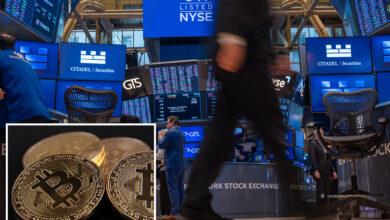Elon Musk’s Tesla has an advantage as Trump’s 25% auto tariffs hit

Detroit’s Big Three automakers will feel the pain after President Trump imposed 25% tariffs on all foreign-made cars and auto parts – while Elon Musk’s Tesla and Rivian will get a leg up on rivals, financial analysts said.
GM and Ford both have significant overseas exposure in their supply chains and could face 30% declines in earnings before interest and taxes (EBIT), a key measure of profitability, analysts at research firm Bernstein said in a Thursday note.
Stellantis, which owns the Jeep and Chrysler brands, is better positioned than its Detroit-based rivals due to “higher US content in Mexican production,” which would be exempt from the tariffs that kick in April 2.
Meanwhile, Tesla manufactures all of the electric vehicles it sells in the US at plants in California and Texas – a key factor that should shield Musk’s pioneering company from the worst impacts of the tariffs. EV rival Rivian also manufactures all of its vehicles in the US.
“Tesla wins, Detroit bleeds,” the Bernstein analysts said.
“Tesla is the clear structural winner: localized, strong market share, better insulated from trade risk,” the analysts added. “For everyone else, this is a margin reset and real drag on near-term earnings power.”
Tesla shares edged up 0.4% in Thursday trading, while Rivian jumped more than 7%. GM plunged 7.4%, Ford fell 4% and Stellantis dropped 4.2%.
Overseas carmakers are expected to suffer the most.
Sweden-based Volvo manufactures just 13% of the vehicles it sells in the US within the states, according to data compiled by Wards Automotive and Barclays and reported by Axios.
Japan’s Mazda (19%), Germany’s Volkswagen (21%) and South Korea’s Hyundai (33%) are also set to be walloped by import duties. Mercedes, BMW and Toyota manufacture less than 50% of their US-sold vehicles domestically.
In total, Bernstein estimates that the levies will result in “up to $110 billion in annual tariff costs” for automakers, which will force manufacturers to either eat the higher costs or pass them along to customers.
Vehicle prices will see an average increase of $3,700, according to the firm’s projections.
Morgan Stanley analyst Adam Jonas put the costs even higher at nearly $6,000 per vehicle.
Italy-based Ferrari said it would hike prices in some models by 10% in response to the tariffs – and some analysts said its high-income clientele are unlikely to be deterred by the bumps. Its US-traded shares rose 3%.
The White House said it expects the tariffs to generate $100 billion in annual tax revenue as well as boost domestic manufacturing by nudging companies to build more stateside plants.
Certain auto parts that are compliant with the US-Mexico-Canada trade agreement “will remain tariff-free” while the Department of Congress works to calculate tariffs on their non-US content.
“FOR YEARS WE HAVE BEEN RIPPED OFF BY VIRTUALLY EVERY COUNTRY IN THE WORLD, BOTH FRIEND AND FOE. BUT THOSE DAYS ARE OVER — AMERICA FIRST!!!” Trump wrote in a Truth Social post on Thursday.
Tesla isn’t totally immune from the tariffs and will still face some higher production costs from its use of imported parts.
Musk downplayed the notion that the tariffs were a net positive for Tesla.
“Important to note that Tesla is NOT unscathed here. The tariff impact on Tesla is still significant,” Musk wrote on X.
Trump has already placed 20% tariffs on all imports from China – whose companies have increasingly challenged Tesla’s dominance in the EV sector.
Both the US and Canada impose 100% tariffs on Chinese-made electric vehicles, which has effectively blocked them from the market.
However, firms like BYD have chipped away at Tesla’s lead in the Chinese market, Europe and other locales.




